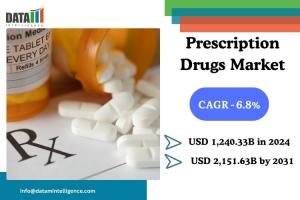Prescription Drugs Market to Reach USD 2.15 Trillion by 2031, Driven by Innovation and Demand | DataM Intelligence
Prescription drug market expands rapidly due to AI in pharma, rising diseases, and global access to advanced therapies.
Download Exclusive Sample Report Here: https://datamintelligence.com/download-sample/prescription-drugs-market
Market Dynamics and Growth Drivers
Several factors are converging to accelerate the market’s growth:
Increasing prevalence of chronic diseases such as cancer, cardiovascular disorders, and diabetes has heightened demand for long-term pharmacological management.
Aging global population is contributing significantly, particularly in developed countries where life expectancy continues to rise.
Biotechnological advancements and the growing adoption of personalized medicine have led to the development of targeted therapies that offer better efficacy and safety profiles.
Rising healthcare expenditure and favorable reimbursement systems are enhancing accessibility to prescription medications.
Government healthcare reforms, particularly in the U.S. and Japan, are reshaping pricing, coverage, and access.
Regional Outlook
North America
North America remains the dominant force in the global prescription drugs market. The United States, in particular, accounts for a substantial share due to its well-established pharmaceutical ecosystem, advanced healthcare infrastructure, and high per capita healthcare spending. Strategic initiatives by key players and ongoing regulatory reforms like the Inflation Reduction Act are also reshaping drug pricing and accessibility in the region.
Europe
Europe follows closely, with countries such as Germany, France, and the UK spearheading innovation. While stringent regulatory requirements can slow product approvals, the region benefits from high awareness, supportive public healthcare systems, and a strong tradition of pharmaceutical R&D.
Asia-Pacific
The fastest-growing region is Asia-Pacific. Countries like India, China, and Japan are witnessing robust demand growth due to increasing urbanization, better healthcare access, and government-led initiatives to expand universal healthcare. Japan remains a key contributor with its aging population and strong domestic pharmaceutical production capabilities.
Leading Companies
F. Hoffmann-La Roche Ltd
Mylan N.V.
Teva Pharmaceutical Industries Ltd
Sanofi
Pfizer Inc
GlaxoSmithKline plc
Novartis AG
Merck & Co Inc
Allergan
Dr. 'Reddy's Laboratories Ltd
Innovation and Technology Integration
Biopharmaceutical advances and the integration of artificial intelligence in drug discovery are revolutionizing the prescription drug development pipeline. AI models are increasingly being used to predict molecule behavior, reducing trial-and-error phases and accelerating time-to-market. Moreover, mRNA technology, popularized during the COVID-19 pandemic, is now being adapted for other diseases like cancer and rare genetic disorders.
Latest News of USA
In the United States, prescription drug pricing remains at the forefront of healthcare policy. A critical update came with the ongoing rollout of provisions from the Inflation Reduction Act, which allows Medicare to negotiate prices on select high-cost drugs. While the scope is limited initially, it signals a paradigm shift that could pressure manufacturers to reevaluate pricing strategies, especially for blockbuster drugs.
Additionally, 2025 is anticipated to bring sharper scrutiny on obesity treatments, with major insurers and pharmacy benefit managers under pressure to include newer, high-demand medications like GLP-1 receptor agonists (e.g., Ozempic, Wegovy) in their reimbursement lists. These drugs have gained popularity for both diabetes and weight loss but come with steep price tags.
Another trend gaining momentum is the rise of direct-to-consumer digital pharmacies, such as Amazon Pharmacy and Mark Cuban Cost Plus Drug Company, which aim to improve transparency and reduce middleman markups. This tech-driven disruption is reshaping how Americans access and purchase medications.
Latest News of Japan
Japan is making strategic moves to reassert itself as a global leader in drug innovation. In 2024, the Japanese government announced a national strategy to boost drug discovery capabilities, emphasizing public-private partnerships and incentives for venture capital investment. This initiative seeks to reverse a recent slowdown in new drug launches and attract international biotech firms to set up R&D centers in Japan.
However, Japan continues to grapple with drug supply disruptions, driven by compliance issues related to Good Manufacturing Practices (GMP). Since 2020, several domestic manufacturers have faced production halts, leading to nationwide shortages of essential medicines. The government has responded by tightening regulatory oversight and incentivizing production process improvements.
Market Segmentation:
By Type: Branded, Generic.
By Therapy Area: Oncology, Immunology, Ophthalmology, Respiratory, Gastroenterology, Gynecology, Others.
By Route of Administration: Oral, Topical, Parenteral, Others.
By Sales Channel: Online, Offline.
By Region: North America, Europe, South America, Asia Pacific, Middle East, and Africa.
Conclusion
The global prescription drugs market is poised for sustained and transformative growth. As therapeutic innovation accelerates and health systems evolve, prescription medicines will play a central role in managing disease burdens and improving quality of life worldwide. While mature markets like the U.S. and Japan tackle pricing reforms and supply chain resilience, emerging regions are gearing up to meet the growing demand for accessible and affordable therapies.
The landscape ahead is one of opportunity and challenge marked by scientific breakthroughs, shifting regulations, and a clear imperative for companies to innovate not just in the lab, but across the entire value chain.
Stay informed with the latest industry insights-start your subscription now: https://www.datamintelligence.com/reports-subscription
Related Reports:
Generic Drugs Market
Antiemetic Drugs Market
Sai Kumar
DataM Intelligence 4market Research LLP
+1 877-441-4866
email us here
Visit us on social media:
LinkedIn
X
Legal Disclaimer:
EIN Presswire provides this news content "as is" without warranty of any kind. We do not accept any responsibility or liability for the accuracy, content, images, videos, licenses, completeness, legality, or reliability of the information contained in this article. If you have any complaints or copyright issues related to this article, kindly contact the author above.
Flat Steel Market Gains Momentum with 6.00% CAGR, Poised to Cross USD 817.20 Billion by 2032
Recovered Carbon Black: A Circular Economy Opportunity Worth USD 4.1 Billion by 2032
Swimming Pool Treatment Chemicals Market to Reach USD 1.53 Billion by 2032, Growing at a CAGR of 2.39%
Więcej ważnych informacji
 Jedynka Newserii
Jedynka Newserii

 Jedynka Newserii
Jedynka Newserii

Polityka

Polska może się stać Doliną Krzemową Europy. Potrzeba jednak wsparcia finansowego start-upów i mocniejszej deregulacji
Polskie start-upy skoncentrowane są głównie na rozwoju nowoczesnych technologii informatycznych i cyfrowych. Wyraźny nacisk na oprogramowanie i aplikacje oraz big data i data science wskazuje na silne zainteresowanie narzędziami analitycznymi i rozwiązaniami wspierającymi transformację cyfrową w różnych branżach – wynika z raportu „Rynek start-upów w Polsce. Trendy technologiczne”, który został opracowany w 2024 roku w MRiT. Zdaniem europarlamentarzystów Polska ma szansę się stać Doliną Krzemową, jednak rozwój start-upów blokowany jest m.in. przez ograniczony dostęp do finansowania oraz niekorzystne i nadmierne regulacje.
Transport
Na półmetku wakacji ceny paliw na stacjach nie powinny się wyraźnie zmienić. Znaczące różnice między regionami i stacjami

W sierpniu ceny benzyny, oleju napędowego i autogazu powinny pozostać na poziomach z lipca – uważa ekspertka rynku z firmy Reflex. Wyższe będą zawsze na stacjach premium, tych, które oferują bogatszą ofertę dodatkową, promocje dla uczestników programu lojalnościowego, oraz w regionach, w których tradycyjnie paliwa są droższe ze względu np. na wyższą siłę nabywczą mieszkańców. Różnice mogą sięgać kilkudziesięciu groszy na litrze. Obszary, wokół których te wartości oscylują, zależą z kolei od sytuacji globalnej. Warto patrzeć na sytuację na Bliskim Wschodzie i w Ukrainie.
Polityka
A. Mularczyk (PiS): Nawiązanie poważnego dialogu z Niemcami jest konieczne nie tylko w kontekście reparacji. Powinien być podpisany traktat polsko-niemiecki

– Nie wystarczy jednorazowy gest czy inicjatywa. To musi być podjęcie dialogu, być może też przygotowanie nowej umowy bilateralnej, nowego traktatu polsko-niemieckiego, który regulowałby wszystkie obszary, które wynikały ze skutków II wojny światowej – mówi Arkadiusz Mularczyk, poseł do Parlamentu Europejskiego z PiS-u. Podkreśla, że proces ten nie będzie łatwy, bo wymaga konsekwencji i stanowczości, ale widzi szansę w prezydenturze Karola Nawrockiego, który już zadeklarował kontynuację starań w tym zakresie. Zdaniem europosła wsparciem w polsko-niemieckim dialogu może być administracja Donalda Trumpa.
Partner serwisu
Szkolenia

Akademia Newserii
Akademia Newserii to projekt, w ramach którego najlepsi polscy dziennikarze biznesowi, giełdowi oraz lifestylowi, a także szkoleniowcy z wieloletnim doświadczeniem dzielą się swoją wiedzą nt. pracy z mediami.




![Nestlé w Polsce podsumowuje wpływ na krajową gospodarkę. Firma wygenerowała 0,6 proc. polskiego PKB [DEPESZA]](https://www.newseria.pl/files/1097841585/fabryka-nesquik_1,w_85,r_png,_small.png)




.gif)

 |
| |
| |
|